24 Nights | CATHEDRALS & COASTS
About Pont, Switzerland
You will visit the following 20 places:

Copenhagen
Copenhagen is the capital and largest city of Denmark. This "friendly old girl of a town" is big enough to be a metropolis with shopping, culture and nightlife par excellence, yet still small enough to be intimate, safe and easy to navigate. Overlooking the Øresund strait with Sweden just minutes away, it is a cultural and geographic link between mainland Europe and Scandinavia. This is where old fairy tales blend with flashy new architecture and world-class design; where warm jazz mixes with cold electronica from Copenhagen's basements. You'll feel you've seen it all in a day, but could keep on discovering more for months. Copenhagen is considered a very liveable place because of its cleanliness. It’s considered as one of the very environmentally friendly cities because its harbour can be swum in and about a third of the city’s people use bicycles as their means of transportation. In their downtown area, the places to visit and to be entertained at are the Tivoli gardens and the Town Hall Square. If you want the very cultural and scenic areas the places to see are the Marble church, the Rosenborg castle, and the Christiansborg.
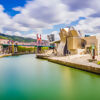
Bilbao
Bilbao is a municipality and city in Spain, a major city in the province of Biscay in the autonomous community of the Basque Country. It is the main urban area in what is defined as the Greater Basque region. Situated in the north-central part of Spain, its main urban core is surrounded by two small mountain ranges. After its foundation in the early 14th century by Diego López V de Haro, head of the powerful Haro family, the city was a commercial hub of the Basque Country that enjoyed significant importance in Green Spain. This was due to its port activity based on the export of iron extracted from the Biscayan quarries. Throughout the nineteenth century and the beginning of the twentieth, Bilbao experienced heavy industrialisation, making it the centre of the second-most industrialised region of Spain. Today, Bilbao is a vigorous service city that is experiencing an ongoing social, economic, and aesthetic revitalisation process, started by the iconic Bilbao Guggenheim Museum, and continued by infrastructure investments, such as the airport terminal, the rapid transit system, the tram line, the Alhóndiga, and the currently under development Abandoibarra and Zorrozaurre renewal projects. Bilbao is also home to football club Athletic Club de Bilbao, a significant symbol for Basque nationalism due to its promotion of Basque players and one of the most successful clubs in Spanish football history.

Gdansk
Gdańsk (Danzig in German) is a port city on the Baltic coast of Poland. Gdańsk is situated at the mouth of the Motlawa River, connected to the Leniwka, a branch in the delta of the nearby Vistula River, whose waterway system supplies 60% of the area of Poland and connects Gdańsk to the national capital in Warsaw. This gives the city a unique advantage as the focus of Poland's sea trade. Together with the nearby port of Gdynia, Gdańsk is also an important industrial centre. Historically an important seaport and shipbuilding centre, Gdańsk was a member of the Hanseatic League. At the center of its Main Town, reconstructed after WWII, are the colorful facades of the Long Market, now home to shops and restaurants.
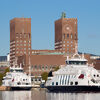
Oslo
Oslo is a county and municipality, as well as the capital and largest city in Norway. Oslo was established as a municipality on 1 January 1838. Founded around 1048 by King Harald III "Hardraade" of Norway, the city was largely destroyed by fire in 1624. The Danish–Norwegian king Christian IV moved the city, rebuilding it closer to Akershus fortress, as Christiania (briefly also spelt Kristiania). In 1925, the city reclaimed its original Norwegian name, Oslo. The diocese of Oslo is one of the five original dioceses in Norway, which originated around the year 1070.
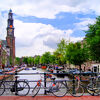
The Convent Amsterdam
Amsterdam is the capital of the Kingdom of the Netherlands. It is the country's largest city and its financial, cultural, and creative centre. Many large Dutch institutions have their headquarters there, and seven of the world's 500 largest companies, including Philips and ING, are based in the city. In 2012, Amsterdam was ranked the second best city in which to live by the Economist Intelligence Unit (EIU) and 12th globally on quality of living for environment and infrastructure by Mercer. Amsterdam derives its name from the city’s origin as “Dam” of river “Amstel”. In the past, the name was "Amstelredamme" which later changed as “Amsterdam”. The city is one of the most popular destinations in Europe, attracting over 7 million international travellers annually. The city is colloquially known as ''Venice of the North'' because of its lovely canals that criss-cross the city, its impressive architecture and more than 1,500 bridges. There is something for every traveller's taste here; whether you prefer culture and history, serious partying, or just the relaxing charm of an old European city!
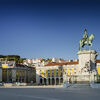
Lisbon
The capital of Portugal, Lisbon (Portuguese: Lisboa) has experienced a renaissance in recent years, with a contemporary culture that is alive and thriving and making its mark in today's Europe. Perched on the edge of the Atlantic Ocean, Lisbon is one of the rare Western European cities that faces the ocean and uses water as an element that defines the city. Lisbon enchants travellers with its white-bleached limestone buildings, intimate alleyways, and an easy-going charm that makes it a popular year-round destination.

Stockholm
Stockholm - Sweden's capital and largest city, and the most populous city in the Nordic region. Without a doubt, Stockholm is one of the most beautiful cities in Europe. The city is made up of 14 islands connected by some 50 bridges on Lake Mälaren, which flows into the brackish Baltic Sea, and passes the Stockholm archipelago with some 24,000 islands and islets. The city is a cosmopolitan place with both classical and modern architecture, and a captivating Old Town, Gamla Stan. Today, the area is an atmospheric mixture of buildings surrounded on all sides by a latticework of medieval lanes and alleyways.

Tallinn
Tallinn is the capital and largest city of Estonia. It occupies an area of 159.2 km2 (61.5 sq mi) with a population of 412,144. It is situated on the northern coast of the country, on the banks of the Gulf of Finland, 80 km (50 mi) south of Helsinki, east of Stockholm and west of Saint Petersburg. Tallinn's Old Town is in the list of UNESCO World Heritage Sites. Tallinn is ranked as a global city and has been listed among the top 10 digital cities in the world. Tallinn is a European Capital of Culture for 2011, along with Turku, Finland.

Porto
Porto (also known as Oporto in English), is the second largest city in Portugal after Lisbon and one of the major urban areas of the Iberian Peninsula. The urban area of Porto, which extends beyond the administrative limits of the city, has a population of 1.4 million (2011) in an area of 389 km2 (150 sq mi), making it the second-largest urban area in Portugal. Located along the Douro river estuary in Northern Portugal, Porto is one of the oldest European centres, and its historical core was proclaimed a World Heritage Site by UNESCO in 1996. The western part of its urban area extends to the coastline of the Atlantic Ocean. Its settlement dates back many centuries, when it was an outpost of the Roman Empire. One of Portugal's internationally famous exports, port wine, is named for Porto, since the metropolitan area, and in particular the caves of Vila Nova de Gaia, were responsible for the packaging, transport and export of the fortified wine. In 2014, Porto was elected The Best European Destination by the Best European Destinations Agency.
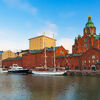
Helsinki
Helsinki is the capital and largest city in Finland. Finland's major political, educational, financial, cultural, and research center as well as one of northern Europe's major cities, Helsinki was ranked the most liveable city in the world, in 2011. Approximately 75% of foreign companies operating in Finland have settled in the Helsinki region. The nearby municipality of Vantaa is the location of Helsinki Airport, with frequent service to various destinations in Europe and Asia. Today, Helsinki pulls off the trick of being something of an international metropolis while still retaining a small-town feel. The best time to visit is in summer, when Finns peel off their overcoats and flock to outdoor bars and cafes to enjoy the sunshine.
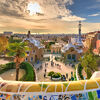
Barcelona
Barcelona – Spain's enchanting capital, second largest and most populous city. It is a huge city that vibrates with life, and there’s certainly not another city in the country to touch it for its sheer style, looks or energy. It is one of the world's leading tourist, economic, trade fair and cultural centers, and its influence in commerce, education, entertainment, media, fashion, science, and the arts all contribute to its status as one of the world's major global cities. Barcelona is home to masterpieces of many great architects – the most famous of which is Antoni Gaudí.

Moscow
Moscow is the capital, the most populous city, and the most populous federal subject of Russia. The city is a major political, economic, cultural, scientific, religious, financial, educational, and transportation centre of Russia and the world. A global city, Moscow is the most populous city on the continent of Europe and the seventh largest city proper in the world. Its population, as of 1 January 2010, is 10,563,038. For many, the sight of the Kremlin complex in the centre of the city is still loaded with symbolism and history. It was the capital of the former Soviet Union and signs of its previous life are very visible even now. Yet, there's more to Russia and its capital than just memories of the USSR.

La Rochelle

Guernsey

Cadiz

Warnemünde
Warnemünde is a seaside resort and a district of the city of Rostock in Mecklenburg, Germany. It is located on the Baltic Sea and, as the name implies, at the estuary of the river Warnow. Founded in about 1200, Warnemünde was for centuries a small fishing village with minor importance for the economic and cultural development of the region. Today, it's known for its long beachfront and marina, a cruise-ship stop.

Zeebrugge

Klaipeda County

Le Verdon-sur-Mer











